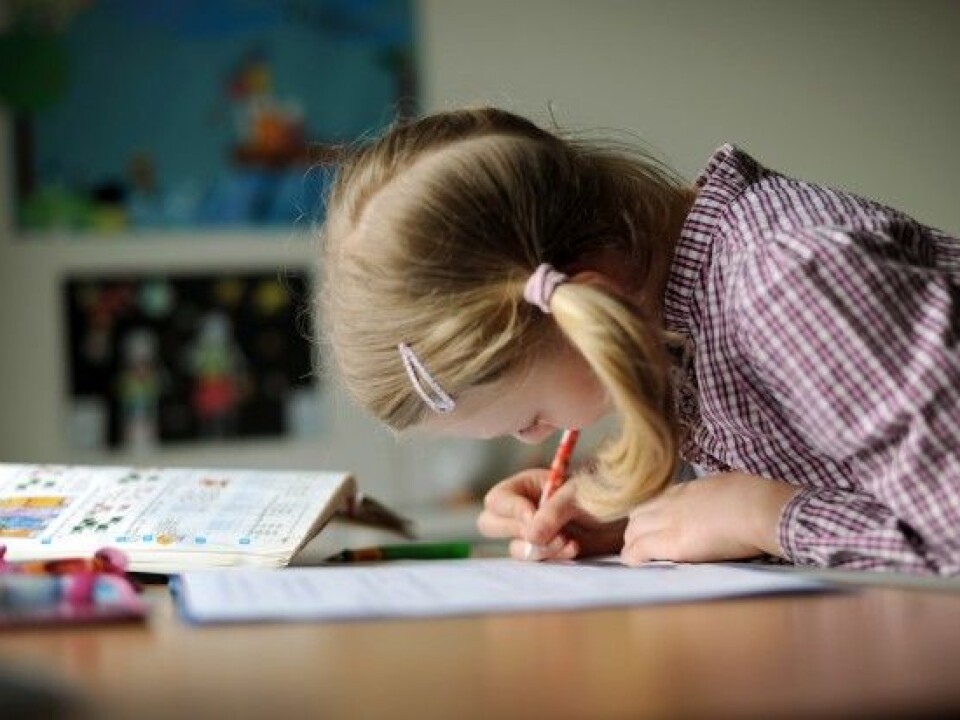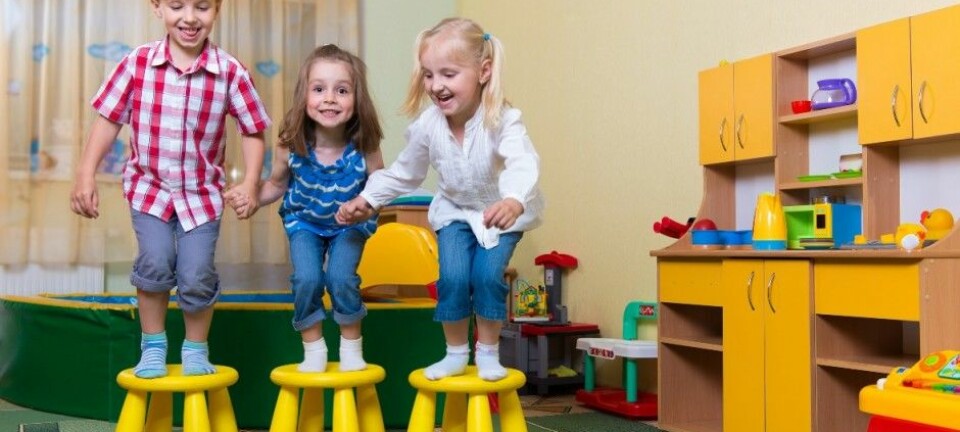This article was produced and financed by University of Stavanger

Girls are better than boys are at regulating their own behaviour
Girls with wealthy and highly educated parents score the highest on self-regulation tests. Researchers believe boys and girls may be given unequal attention - both by parents and day care staff.
Denne artikkelen er over ti år gammel og kan inneholde utdatert informasjon.
The entire class is concentrating on the maths tasks when Per suddenly exclaims: "I want to go out and play!"
What makes Per actually run out to play while Kari stays put? And what enables someone to ignore sudden interruptions, while others get carried away when someone suddenly exclaims: "Look, Marcus has started throwing his eraser around!"
"Self-regulation" is the term used by psychologists and educators to describe the phenomenon. And international research shows that those who, in their childhood, show a high degree of self-regulation and attentiveness have a higher chance of getting an education and being economically safe later in life. They also have a lower risk of being involved in crime and experiencing health problems.
The term has become popular internationally, but is rarely used in research in Norwegian daycare centres.

However, in a University of Stavanger project, researchers have closely examined how sex and socio-economic background affect Norwegian children's ability of self-regulation.
Not the same as discipline
"The results show that girls score higher than boys do at self-regulation," says Professor Ingunn Størksen at the Centre for Learning Environment.
Self-regulation is an ability everyone has, and which is necessary for us to function in our daily lives. It is a central element of our social competence; and is essential in children while playing, as well as for them to be involved in learning activities.
"Many people misunderstand, and think that self-regulation is about discipline; but it is not the same," says Størksen.

Simply explained, self-regulation is the capability we have of volitionally controlled behaviour. We use attention, memory and impulse-control in such a way that we can reach our goals and adapt to social interaction with others.
Three degrees of difficulty
In the study from the Centre for Learning Environment 243 children, aged 5-6 years, were assessed using the head-toes-knees-shoulders test, an international test consisting of three degrees of difficulty. In addition, the educators filled out a questionnaire about the children's ability of self-regulation in daycare activities.
In the individual test the children were asked to touch their head, shoulders, knees and toes as the researchers told them what body part to touch. If the children were able to do this, they moved on and the instructions became harder.
In the next stage the children were asked to swap the body parts; for example, by touching their knees when told to touch the head.
"These exercises require the child to readjust, remember the instructions, maintain control of the body and regulate their behaviour," explains Associate Professor Ingunn T. Ellingsen. She further explains that the researchers only moved on if the children managed the first stage.
"It was very important to the researchers that this should be a pleasant time for the children, and that they should experience success. The test is designed so that the children do not move on to the next stage if they do not manage the first stage. They are not to experience pressure to manage things they find hard," says Ellingsen.
The children generally expressed that they liked the tests, and several of them wanted to be "tested one more time".
Language difficulties may be a reason
The children were assessed on a scale from 0-60, and the results varied over the entire scale.
"There may be concrete difficulties in the picture with the children who scored very low on self-regulation. It is important that those who work with children are aware of this, and that they try to understand what the underlying cause is and not just focus on self-regulation," recommends Ingunn Størksen.
Self-regulation is connected to the actual life situation of the child. Could a low degree of self-regulation be caused by, for example, language difficulties or emotional issues?
Stimulating boys and girls differently
The results from both, the individual test and the answers of the educators on the questionnaire, indicated that the girls scored a bit higher on self-regulation than the boys did.
"In a way, this is not so surprising, as the neuropsychologist tells us there may be a difference in the maturity of boys and girls at that age. On the other hand, we do not find these differences in sex in other cultures. We will, for example, not find these differences in certain Asian cultures," explains Størksen.
The results from the individual test also indicated that the parents' socio-economic status, evaluated from their education and economic status, had an impact on the self-regulation of the girls, but not of the boys.
"The reason for this may be that Norwegian parents with a lot of resources motivate boys and girls differently, and that the girls participate in activities promoting self-regulation to a higher degree than do the boys," says Størksen.
Maturity is not everything
The researchers suspect that the difference in gender does not only lead to the difference in maturity between boys and girls. They believe that girls might get more attention in daycare than do the boys; and that girls, more often, are in the company of adults, which stimulates self–regulation to a higher degree.
"In this context, it is interesting that researchers have not discovered differences between the genders, regarding the ability to self–regulate, among children in certain Asian cultures. We should ask if there is anything Norway could do in order to motivate boys more when it comes to self-regulation," says Størksen.
Safety and guidance
Researchers believe the most important aspect in order to motivate children is that the adults commit to warm and safe relationships with the children, where they also guide the children.
The researchers encourage the daycare educators to spend as much time as possible with the boys too, and that they participate in fun activities which the boys like - for example, football.
"In this way the adults are able to help the boys articulate and interpret conflict situations, be a guide during playtime, and to be there for the boys who need help regulating the feeling occurring at that moment. This may help in stimulating self-regulation," says Størksen.
Stimulating play
Even though self-regulation occurs naturally, a stimulating environment is also important, but Ellingsen stresses that one should not effectuate extensive measures. Spontaneous play and playtime guided by adults may contribute to promote self-regulation.
"Role play with other children is a great situation to practice self-regulation. In this case children have to abide by the premise set for the game by the group, and adapt their behaviour and input to what the children have agreed upon," says Størksen.
"Games with rules, such as Red light/Green light and Simon Says, are fun activities which require concentration and which may contribute to stimulating the ability to inhibit impulsive actions."
Tips for activities
The researchers in Skoleklar are currently working on a guide for daycares on the subject. The guide will include tips for various activities, as well as a presentation of the concept of self-regulation.
Størksen hopes that the guide may contribute to increased awareness of self-regulation in Norwegian daycares.
The adults can achieve a lot by just paying attention to this subject and knowing that self-regulation is a part of children's natural development which adults can be supportive of
--------------------------------------------------
Read the Norwegian version of this article at forskning.no
Translated by: Leif Magnar Wikse


































